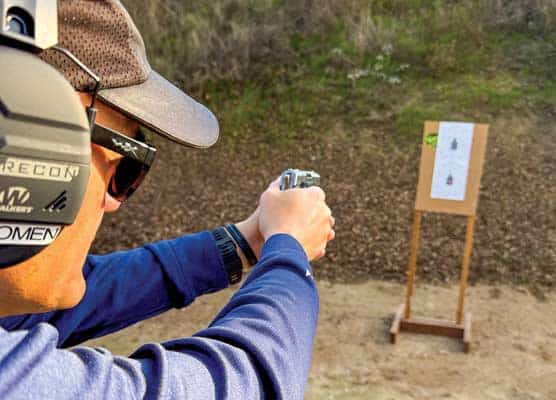"Safety" Trumps Freedom All Too Often
Will A Law-And-Order President Be Good For Gun Right?
Remember Ben Franklin’s warning: “Those who would give up essential liberty, to purchase a little temporary safety, deserve neither liberty nor safety.” When electioneering democrats promised us safety at the expense of liberty, we were smart (lucky?) to have kept “that woman” out of the White House. We knew the cost — assassination of every right to arms imaginable, whether legal, constitutional or not.
The campaign promising Australian-style confiscation and destruction of our firearms had already drafted bills to that effect. We dodged a bullet. Or did we?
Government isn’t the solution, but you know this. The main threats to freedom originate from government. Our Constitution is designed to defeat these, to forbid all powers not delegated, and reserve those ultimately to the people. And you know how well this works — it’s a constant struggle to hold back the forces of darkness.
The battle isn’t over because “our guy” won. Remember we had serious doubts about both finalists. Those did not evaporate with ballots.
Anticipating a left-wing onslaught, we drafted a bill here in Arizona to forestall the coming assault. With luck, we will get this introduced and enacted — a definition of infringement — which has never been done before, a fact surprising us:
“Making a legal gun illegal is infringement.”
Infringement is bigger, of course, but this is a bright red line. If a gun (or related gear) you own today is declared illegal tomorrow, your right and ability to own it has clearly been infringed. I searched all 92 decisions in my unabridged book Supreme Court Gun Cases — the word infringed appears repeatedly, but it is never defined.
Similarly, state statutes lack definitions. A huge array of gun situations are litigated, defendants are found guilty or not, but none declare an action to be infringement. Even Black’s Law Dictionary, a quintessential authority, defines infringement only for intellectual property law — copyrights, patents, trademarks — remarkable!
Now we can’t do anything about the federal government declaring certain arms or accessories illegal, (if they choose to illegally do so). But in this state, if we pass the bill, those would become infringed items, also by definition. We’re fully within our rights and powers to do this. Nothing really happens by creating these definitions.
Crucial Definition
Where our rights are protected is with the third crucial definition: Any effort to remove an infringed item from its legal owner is aggravated infringement, a class 4 felony for a first offense. You cannot take away constitutionally protected property people legally owned yesterday by declaring it illegal tomorrow. The 2nd, 4th, 5 th, 10th, 14 th Amendments and now state law are backups.
Critically, this gives cops legal footing if they ever receive dubious orders to confiscate (normally legal) arms. Officers often claim they would never confiscate guns because they honor the Second Amendment. But that’s a rock and a hard place. They can’t disobey a legal order. But can confiscation orders truly be legal? Now, they have justification, obey state law or commit a crime. It sets up true balance of power, federalism, between the state and the feds, over the key issue — exercise of actual power.
This remains vital even though the give-us-your-guns side lost the election. Some people meet, “Give up your guns,” with, “Sure, bullets first.” Demands to disarm the public aren’t received well. This bill provides an elegant deterrent to what could otherwise get ugly. It implies: Don’t even think about enforcing such unconstitutional overreach here. “These aren’t the droids you’re looking for,” as was said in Star Wars. Sheriffs can deputize the public to enforce the laws if needed, you know.
So what of Donald John Trump? We’re hoping for the best, yet we noticed his understanding of the Constitution lacked some depth during the debates. When his opponent spouted gross errors about guns, the Supreme Court, the Heller case, he appeared to lack the knowledge or philosophy to challenge those on substantive grounds. Heller was about toddlers? The Court is supposed to do what’s best for people? Puhleeeze!
Mr. Trump expressed pride and pleasure in having a firearm carry permit in New York. Is this an affront to every decent person who cannot possibly get one there? The outrageously repressive laws in this city, the entire scheme of needing government papers (with expiration dates) anywhere to exercise your rights — is he bothered by this? Are you?
It’s not unreasonable to expect he will have first-rate advisors to help him moving forward. But what values will they hold — mainstream permit-law or constitutional-carry goals? Gun guys are already cheering for a national-carry permit, or national reciprocity, or some sort of relief from failure to enforce the Second Amendment against all the government perpetrators who deny citizens their rights.
Empowering Government?
The last thing you want is to empower the federal government to “issue rights” to permit holders (with conditions of course, which will grow over time), and exclude every decent American, all 97 percent of us, who lack official papers. Will permits seem natural and right to a law-and-order power broker? When rights are “issued” they come with strings. Fees (but they’re small!), wallet cards (but you must have them, cardlessness is a crime), restrictions on where your rights are active (but it’s a short list, subject to change).
You get the point. Trainers, they’ll be smitten by dollar signs. (Jobs! Customers!)
Instead of passing laws so people — with or without papers — get their rights reenacted, the best approach is to repeal laws that have unconstitutionally usurped your rights. We don’t need no stinkin’ laws, we need to kill the bad ones. Being a moderate, I would take it further. Officials responsible for enacting laws to deny your constitutional rights belong in prison for “denial of civil rights under color of law,” a federal felony (18 USC §241 et seq.).
Alan Korwin’s website features plain-English books on state and federal gun laws for the public. He invites you to write to him or see his work, at GunLaws.com.




